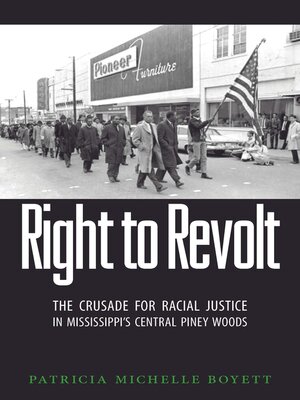Right to Revolt
ebook ∣ The Crusade for Racial Justice in Mississippi's Central Piney Woods
By Patricia Michelle Boyett

Sign up to save your library
With an OverDrive account, you can save your favorite libraries for at-a-glance information about availability. Find out more about OverDrive accounts.
Find this title in Libby, the library reading app by OverDrive.



Search for a digital library with this title
Title found at these libraries:
| Library Name | Distance |
|---|---|
| Loading... |
Winner of the 2016 Eudora Welty Prize
On January 10, 1966, Klansmen murdered civil rights leader Vernon Dahmer in Forrest County, Mississippi. Despite the FBI's growing conflict against the Klan, recent civil rights legislation, and progressive court rulings, the Imperial Wizard promised his men: "no jury in Mississippi would convict a white man for killing a nigger." Yet this murder inspired change. Since the onset of the civil rights movement, local authorities had mitigated federal intervention by using subtle but insidious methods to suppress activism in public arenas. They perpetuated a myth of Forrest County as a bastion of moderation in a state notorious for extremism. To sustain that fiction, officials emphasized that Dahmer's killers hailed from neighboring Jones County and pursued convictions vigorously. Although the Dahmer case became a watershed in the long struggle for racial justice, it also obscured Forrest County's brutal racial history.
Patricia Michelle Boyett debunks the myth of moderation by exploring the mob lynchings, police brutality, malicious prosecutions, and Klan terrorism that linked Forrest and Jones Counties since their founding. She traces how racial atrocities during World War II and the Cold War inspired local blacks to transform their counties into revolutionary battlefields of the movement. Their electrifying campaigns captured global attention, forced federal intervention, produced landmark trials, and chartered a significant post-civil rights crusade. By examining the interactions of black and white locals, state and federal actors, and visiting activists from settlement to contemporary times, Boyett presents a comprehensive portrait of one of the South's most tortured and transformative landscapes.
On January 10, 1966, Klansmen murdered civil rights leader Vernon Dahmer in Forrest County, Mississippi. Despite the FBI's growing conflict against the Klan, recent civil rights legislation, and progressive court rulings, the Imperial Wizard promised his men: "no jury in Mississippi would convict a white man for killing a nigger." Yet this murder inspired change. Since the onset of the civil rights movement, local authorities had mitigated federal intervention by using subtle but insidious methods to suppress activism in public arenas. They perpetuated a myth of Forrest County as a bastion of moderation in a state notorious for extremism. To sustain that fiction, officials emphasized that Dahmer's killers hailed from neighboring Jones County and pursued convictions vigorously. Although the Dahmer case became a watershed in the long struggle for racial justice, it also obscured Forrest County's brutal racial history.
Patricia Michelle Boyett debunks the myth of moderation by exploring the mob lynchings, police brutality, malicious prosecutions, and Klan terrorism that linked Forrest and Jones Counties since their founding. She traces how racial atrocities during World War II and the Cold War inspired local blacks to transform their counties into revolutionary battlefields of the movement. Their electrifying campaigns captured global attention, forced federal intervention, produced landmark trials, and chartered a significant post-civil rights crusade. By examining the interactions of black and white locals, state and federal actors, and visiting activists from settlement to contemporary times, Boyett presents a comprehensive portrait of one of the South's most tortured and transformative landscapes.







